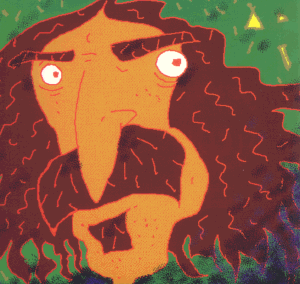|
Okay--we're pretending to be serious now--
Popular music tells us something about popular culture, which then tells us something about popular thought processes (or the absence thereof).
When rock and roll first appeared, adults were completely hostile towards it. Today, they aerobicize to it.
The people who performed it--as well as its consumers--were thought of in the beginning as an undesirable social element. Then the sixties came along and, wonder of wonders, natives from a miserable little island off the coast of France reinvented this wheel and rolled it back in our direction (right over our foot). With a sickening crunch, the Beatles and the Rolling Stones became household words in America.
The British Invasion introduced us to the concept of the self-contained singing band. Singing bands who played their own instruments were not common in the United States at that time (we had surf music). Up till then, rock records were made either by soloists or groups of vocalists, backed by anonymous guys who attempted to operate musical instruments.
The success of the British groups forced a change in the way new American groups were put together. They now had to be self-contained, because every bar that hired live music wanted its own little U.S. version of the Beatles or the Rolling Stones.
During this period, it was discovered that millions--perhaps billions--of dollars could be made by selling circular pieces of black plastic in a cardboard sandwich with a stupid picture on the front.
In the beginning, "The Big Bucks" were made by low-life chiselers who screwed doo-wop groups out of their royalties. While the chiselers played golf, the singers vanished into the never-never land of needles and cookers.
The seventies came along. By then, the captains of corporate America had convinced themselves that they had The Answer, and so it came to pass that the world was introduced to the warmth and sincerity of corporate rock.
Corpo-rock mutated into 'disco'--developed on the actuarial assumption that music by nonpeople is better and cheaper than music originating from 'the alternative source.'
All those nice men who owned the bars and clubs where groups used to develop stopped hiring musicians, and replaced them with record players, big speaker systems and twinkling lights.
Disco satisfied social as well as musical needs. Disco people got to dress up all the time and go to places (if the guy at the door let them in) where everybody sort of 'looked good'--and later, after an evening of chemical alteration, everybody looked even better, and the next thing they knew, they were getting The Blow Job.
Punk, in the late seventies, purported to be a rebellion against that sort of silly behavior. Maniac bands started thrashing away in dingy little places with no decor, developing their own silly behavior. Yes, punk took us back to the energetic roots of rock and roll--and its mysterious accounting procedures. The guys with the safety pins in their noses probably netted less than their doo-wop junkie ancestors.
New wave evolved form punk, basically, by sterilizing its own safety pin. Newly glammed punksters sang "Yum-yum!" as they 'assumed the position' once again, sucking The Corporate Hooter (it's crusty nozzle emerging from a 'space-cloth' nursing bra this time). - from The Real Frank Zappa Book

The pirAnts are pleased to see so much of the crust devoted to Frank Zappa. To prevent Zappa from being further misunderstood by the crusties, we are providing just a few excellent Zappa sites and some Zappa-INSPIRED sites.
|